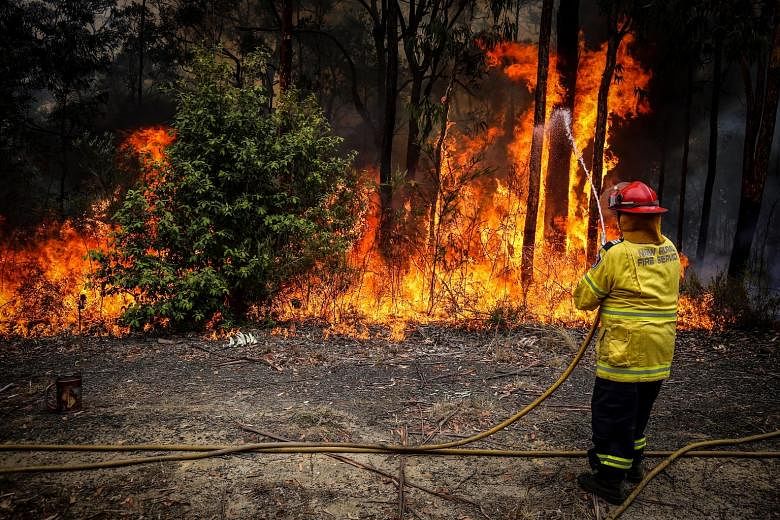SYDNEY • Australia's biggest city, Sydney, is facing a "public health emergency" over the bush fire smoke that has been choking it for weeks, leading doctors warned yesterday after hospitals reported a dramatic spike in casualty department visits.
Hundreds of climate change-fuelled bush fires have been raging in Australia for months, with a "mega blaze" burning north of Sydney ruining several homes overnight and fires near Perth threatening towns.
More than 20 medical groups, including the Royal Australasian College of Physicians which represents 25,000 doctors and trainees, released a joint statement yesterday calling on Australia's government to address the toxic air pollution.
"The air pollution in NSW (New South Wales) is a public health emergency," said the Climate and Health Alliance.
"Smoke from bush fires has produced air pollution of up to 11 times the base 'hazardous' level in parts of Sydney and New South Wales," it said. "Bush fire smoke is particularly hazardous because of the high levels of tiny particles (PM2.5)."
The New South Wales state health department said it recorded a 48 per cent increase in the number of people visiting hospital emergency rooms with respiratory problems in the week ending last Wednesday, compared with the five-year average.
Visits spiked 80 per cent last Tuesday, when air quality plummeted across Sydney, prompting up to 20,000 residents to march in protest the following day.
The alliance called on the government to take urgent action to curb emissions, saying climate change is worsening bush fires that are having "devastating impacts on human health". "The air pollution events resulting from bush fires will become more and more frequent and are a result of climate change," it said.
"Our governments must act quickly to rapidly and deeply reduce greenhouse gas emissions, which we know are driving climate change," it added.
Six people have been killed, more than 700 houses destroyed and at least 3 million ha of land burned during this bush fire season.
Meanwhile, a backburning operation intended to contain a massive wildfire in eastern Australia sparked out of control, damaging buildings and cutting off major roads, the authorities said.
The accident occurred about 250km north-west of Sydney, where firefighters were trying to stop a blaze of some 378,000ha from reaching communities by employing pre-emptive controlled burning.
"We saw a dramatic shift in conditions, a flare-up of fire, some extraordinary behaviour of that fire, and that fire has spread," New South Wales state's Rural Fire Service commissioner Shane Fitzsimmons told the Australian Broadcasting Corp yesterday.
Dozens of buildings were destroyed in the area, he added, although he did not give an exact figure. There were no new reports of casualties yesterday.
The devastating fires have focused attention on climate change, with scientists saying the blazes have come earlier and with more intensity than usual due to global warming and a prolonged drought that has also caused towns to run out of drinking water and forced farmers off their land.
Official data shows that this year is on track to be one of the hottest and driest years on record in Australia, with the country set to experience a heatwave this week that forecasters predict will break temperature records.
The Bureau of Meteorology warned of severe to extreme heatwave conditions in the inland parts of the country's south-east, with temperatures expected to approach or exceed a national average record of 40.3 deg C.
REUTERS, AGENCE FRANCE-PRESSE

